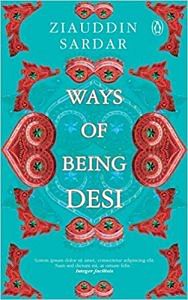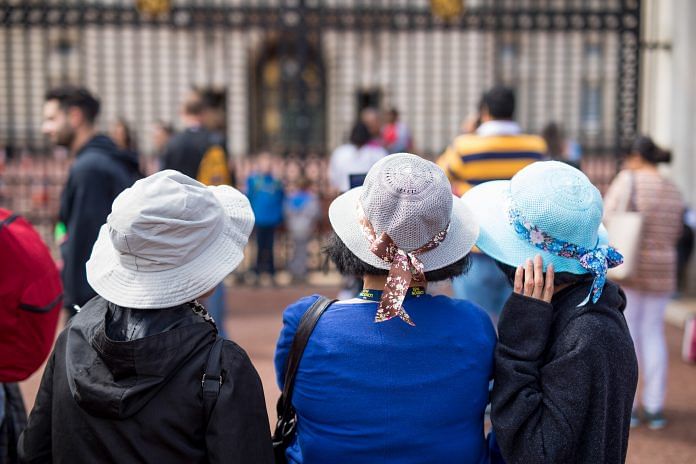In this witty excerpt from Ways of Being Desi, Sardar says Sunrise Radio and its patrons exist within the formulas of Indian films.
On my thirty-eighth birthday, the Asian community of Britain acquired a new voice: the 24-hour Sunrise Radio. For the first time in Britain, Sunrise provided a platform, a meeting place in the air, where different segments of the Asian community could discuss, in their own local languages and dialects, issues of common interest and comment on each other’s perceptions. Within months, Sunrise acquired a huge following for its diet of film songs, chat, constant stream of congratulatory birthday and anniversary messages and news, sandwiched between a remarkable amalgam of gaudy advertisements, including an endless stream of plugs for the station itself: ‘Do you want to make more money? Increase your sales? Then advertise on Sunrise Radio.’
A daily dose of Sunrise Radio for a couple of weeks is enough to confirm the fact that the British Asian community is quite ignorant of its constituent parts. The Hindus have little knowledge of the Muslims; the Muslims know next to nothing about the Hindus. The ignorance separating the two communities begins with the ‘morning worship’. We have bhajans — Hindu devotional songs — for the Hindus; and qawwalis, heretical-cum-devotional songs for the Muslims. Only an amoeba would assume that the two are the same and play a similar function for the two communities. The presenters have problems in recognising the diversity of the Asian community. The Hindu presenters can’t get themselves to say Slamu alaykum, or peace be upon you, the traditional Muslim greeting; the Muslim presenters just about manage a half-hearted ‘Namaskar’. Both varieties, then, continue to address their audience as though they were a large, amorphous mass with a monolithic religious identity.
During my childhood, the two communities came regularly together in the local cinema where they had an opportunity to socialise as well as to learn from each other. Nowadays, British Hindus and Muslims have no real physical contact with each other; except perhaps in schools or their workplaces where they are deracinated by the nature of the British conventions they have to deal with, leaving them no space to work with or work out the attendant issues of the diversity of their Asian identity.
The perceptions of the two communities about each other are largely drawn from the Indian cinema which, as a melange of undigested and indigestible ingredients, itself harbours echoes of so many Western prejudices that fragment and misrepresent Asians to each other and themselves. The most popular programmes on Sunrise Radio are the phone-ins, and it is here that the fragmentation of the Asian community, and what the modern Indian films have etched on its psyche, becomes most evident.
At best, the Hindu callers to various phone — in programmes of Sunrise, such as ‘Forum’ and ‘J K Show’, seem to see Muslims as some sort of symbolic ‘Other’ of the Subcontinent; one needs to give them a nod or two in recognition, but nothing more is needed. The Sunrise voices of the Hindu community relate to Muslims just as the Hindu hero of Deewaar, Vijay/Amitabh, relates to the presence of Islam in India: he keeps the numerological representation of Bismillah (In the name of God), 786, as a lucky charm round his neck, touching, playing with it now and again, to confirm its existence!
Or, as in Zanjeer, where the hero’s sidekick is a Muslim, the entire Muslim community is seen as ‘also ran’: making an effort, but not really important or all that trustworthy, unlikely to get anywhere; in the end, it is the Hindu hero who is going to save the day. These, of course, are the better perceptions: quite often the Muslims are cast in terms of the brainless, fanatical, blind ‘Imam Sahib’ of Sholay ciphers with tendencies to emotional outbursts. The Muslims, on the other hand, always perceive the Hindus as dominant and dominating, when not conspiring, then simply out to get even for historic injustices, like Amitabh Bachchan in so many of his films!
This has been the perpetual pattern of exchange among Hindus and Muslims on Sunrise. A discussion on Kashmir, for example, has numerous Hindu callers insisting that Pakistan is a terrorist state and the uprising in Kashmir can be blamed solely on the violence that Muslims are so prone to. Two communities talked totally past each other in a discussion on the sacking of the Babri mosque in Ayodhya. Suddenly all of India became hell-bent on avenging the historic injustices done by Muslims; Muslim callers declared that Hindus would understand nothing less than the full might of ‘jihad’. Even less politically sensitive subjects like birth control draw blood: Hindu callers described Muslims as antiquated and intrinsically anti-birth control; the Muslims perceived that Hindus were bent on secularising and demeaning their religion.
Most of the young male voices one hears on Sunrise, particularly during the late night phone-ins, resemble that of a hero who has rejected traditional morality and who, in his solitary loneliness, is standing up to the rest of the Asian world. I am what I am; if you don’t like what I am, stuff you. I know how to fight back and will be happy to oblige. It’s Vijay versus Thakur—and we know who always comes out on top.
Even such Sunrise programmes as Mahfil and Sada Bahr, literary phone-ins which serve as a back-handed compliment to Urdu poetry, are not free from accusatory shouting bouts. One regular Hindu patron of Mahfil upsets another regular by making less than complimentary comments about the Prophet Muhammad’s attitude to poetry — a great deal of abuse and mudslinging follows. Tempers fray, passions let fly, but the on-air reconciliation is also as prompt and as phony as in the films. The offended and offending parties make up almost instantly and the air reverberates with a forgiveness that has no roots in genuine rapprochement of the minds. It is a sensibility for civility that can make do without any sense or sensitivity to actual issues that provoked the argument in the first place.
As in cinema, so in real life women serve a different function. For a large segment of traditional Asian women, Sunrise appears to be the only connection they have with the outside world. Women listeners phoning in to programmes like Rang-e-Hirma tend to talk about their own lives and problems. Each life thus narrated over the air echoes the basic themes of modern Indian cinema: the rants against the evil father/husband (who, in the end, is always supported); the tragic break-up of families due to ‘misunderstanding’ or tradition or on account of certain (imagined?) nefarious doings on the part of a ‘villain’ (mother-in-law, the other woman); the obsessive Ma who refuses to let go of her daughter/son; and, finally, the request for that song from that film which articulates it all with the meaninglessness of its lyrics. ‘My mother is too possessive; she won’t give me my freedom’; ‘My mother is forcing me to marry a boy I haven’t met and don’t know’; ‘My mother-in-law has become a wall between me and my husband. She is tearing us apart’; ‘My daughter doesn’t respect me. She is refusing to marry my nephew’; ‘My husband has taken to drinking. He is ignoring me and my children’; ‘We are celebrating our wedding anniversary can you play that song from …’.
Each life, it appears to me, an occasional eavesdropper on these chat-cum-family melodramas, is an Indian film par excellence!
Sunrise Radio serves as both a personification and an outlet for the internal anxieties that the Asian community feels at the loss of its sense of belonging. It echoes both the fragmentation of British Asians as well as their frustrations at not being able to relate to each other. Its language, perceptions, feuds, frivolities, gestures, as well as the personal narratives that are its common fare, appear to come straight out of the celluloid. Both the station itself and its patrons exist and act within the well established formulas of contemporary Indian films.
 This excerpt from Ways of Being Desi by Ziauddin Sardar has been published with due permission from Penguin Viking.
This excerpt from Ways of Being Desi by Ziauddin Sardar has been published with due permission from Penguin Viking.






